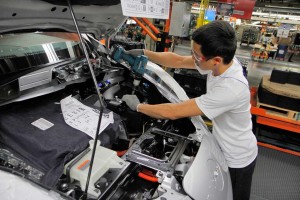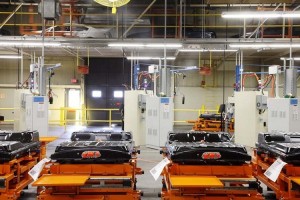Nissan, true to the vision of its chief executive, remains upbeat on the prospects for sales of electric vehicles as its launches production of a revamped U.S. version of the Leaf.
After suffering unexpectedly slow sales last year, demand for the Nissan Leaf has picked up sharply in recent months – and the introduction of a lower-cost model is expected to boost sales even further. Nissan was able to drop costs, it says, by shifting Leaf production to it sprawling factory complex in Tennessee – where the maker is now producing the electric vehicle’s batteries, as well.
The Nissan Battery Plant in Smyrna, Tennessee is the largest lithium-ion automotive battery plant in North America and the only plant controlled by a major auto manufacturer, giving Nissan complete control of the quality and the technology, representatives of the Japanese automaker, noted Mark Swenson, vice president of product engineering.
The new plant, which covers 475,000-square feet, is making battery components for the all-electric, zero-emission 2013 Nissan Leaf, and will supply batteries for other electric vehicles to come. It is one of three factories of its kind in the world operated by a major automaker. Nissan also builds electric motors for the Leaf at its engine plant in Decherd, Tennessee, Swenson said.
Production is scalable up to 200,000 batters annually depending on market demand. Adding production of the Nissan Leaf and the battery resulted in the creation of more than 300 U.S. manufacturing jobs.
“We are the global leader and we intend to stay the global leader,” noted Brendan Jones, who is responsible for directing sales of the Leaf in the U.S. “Eighty percent of the buyers of the Leaf are new to the Nissan brand, which means it’s a gold mine for us. We’re also seeing younger buyers, better educated with credit scores we’re very pleased with our buyer profile,” he said.
The 24 kilowatt-hour battery powers the Nissan Leaf for up to 84 miles, according to EPA ratings, and Nissan boasts it is one of the safest in the industry with its flat and laminated structure.
The new battery plant is located adjacent to Nissan’s existing vehicle assembly plant in Smyrna, which has been retooled to accommodate production of Leaf. Adding production of Leaf and its batteries has resulted in the creation of more than 300 U.S. manufacturing jobs to date.
The Leaf is manufactured on the same line as Altima and Maxima so volume can readily be adjusted among the vehicles to meet demand.
Nissan also used the shift of production to Smyrna to make changes to the vehicle, including improvements to the heating and cooling system, that actually resulted in an increase in range. The regenerative braking system also has been overhauled to make the customer experience more appealing, Jones said.
Nissan has also added a new 6.6 kW onboard charger that reduces charging time nearly in half, to approximately four hours, when using a 220-volt circuit.
But what may be the most significant update is the addition of a new, entry-level Leaf S grade, which is priced several thousand dollars under the existing SV and SL grades.
At the other end of the pricing spectrum, an array of feature enhancements are added to the Leaf SL grade, including leather-appointed seating and 17-inch aluminum alloy wheels. Also, three new option packages are available – offering advanced features such as Around View Monitor and a 7-speaker Bose energy-efficient audio system.
With the addition of the Leaf S model, Jones noted, the base price of the battery-electric vehicle drops by as much as $6,400. And when adding in rebates and tax credits, the transaction price in some parts of the country drops to as little as $18,800. “The price also includes a longer more robust warranty on the battery,” Joanes said.
Since December 2010, Nissan has delivered more than 23,000 Leafs to U.S. customers and nearly 60,000 worldwide, making it the most successful 100% electric vehicle in history. Sales in the States too an unexpected tumble last year, however, the Leaf missing its sales target for the second year in a row. But demand has begun to pick up sharply in recent months.
In fact, the 2,236 sold in March sharply exceeded the forecast made by Nissan Motor Co. CEO Carlos Ghosn during last month’s New York Auto Show where he predicted deliveries of about 1,900.
“Opening this U.S. plant is an important milestone in Nissan’s overarching strategy to foster sustainable mobility around the world,” said Ghosn, during the opening of the battery plant.
“Nissan is the zero-emissions vehicle leader, and we are making significant strides as one of the largest producers of electric vehicles and batteries in the United States. The opening of this facility in Tennessee supports our goal of making zero-emissions mobility a reality through American jobs and American manufacturing,” Ghosn said.
Nissan plans to expand its battery vehicle line-up in the coming years, with its Infiniti brand to get a new counterpart to the Leaf in 2014. It has not been confirmed whether that model will also be built in the States.
Meanwhile, Nissan is adding new hybrids and plug-ins will likely follow. For the moment, models like the Altima Hybrid still source their batteries from Japan, but the Smyrna plant could also produce the hybrid packs, as well, with a modest investment, noted Nissan Senior Vice President Andy Palmer, in a conversation with TheDetroitBureau.com.
The addition of a Leaf assembly line in the U.S. is part of Nissan’s strategy to localize core-model production. By 2015, Nissan aims to have 85% of all Nissan and Infiniti products that are sold in the United States produced in North America.
Nissan, which is in the middle of a product blitz launching five key models in 15 months, reported an all-time record for annual sales for the brand in 2012, with over 1 million units sold in the States. That has helped it top 8% market share, but Ghosn recently stressed his near-term goal is to reach at least 10% share.
Paul A. Eisenstein contributed to this report.



This will end up being an expensive tax write-off and toxic waste dump to be cleaned in a few years.